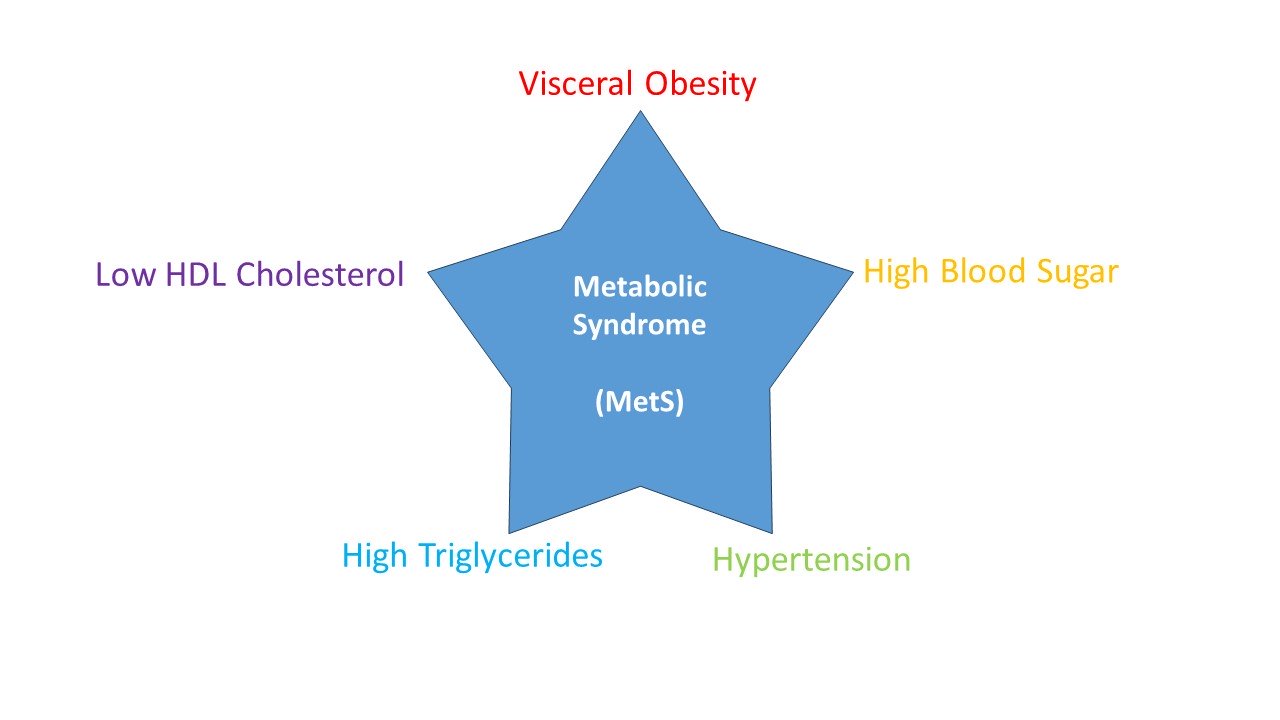- Home
- Metabolic Syndrome
What is Metabolic Syndrome?
What is Metabolic Syndrome (MetS) and why should you care? Those are great questions. Turns out it’s an exceptionally important topic if you’re interested in your health. Since this syndrome affects 30% of the US population, I think it’s time we learned more about it! How about you?
What is Metabolic Syndrome and How Do You Know You Have it?
According to the International Diabetes Federation, having 3 or more of the following conditions as well as having a large waist circumference (AKA: visceral obesity) indicates you have Metabolic syndrome.
Those conditions are:
- high blood pressure
- high blood sugar
- high triglycerides
- low HDL cholesterol
Let’s have a look at each measure.

Visceral obesity means carrying excess fat around
the middle. When you see a big “beer belly”, that’s visceral fat. It’s not just
on the outside. It’s fat that’s wrapped
around vital internal organs. If that doesn’t sound very healthy, it’s because
it’s not.
For men, a waist measurement greater than 40-inches (102cm) is a sign of trouble. Don’t go by the size of your pants. Most men with a big belly wear their pants under their belly just above their hip bones. Measure around at the bellybutton! Suddenly what you thought was a size 36 waist turns out to be a whole lot bigger. Ahem! Sorry Gents.
Women’s waist measurement should be less than 35-inches (88cm). Again, the measurement is taken at the belly button. So, no cheating!
High Blood Pressure or Hypertension puts you at risk if your readings are above 130/85mm Hg. You’re also at risk if you’re taking medication to control your blood pressure.
The upper number is the systolic pressure which measures the pressure in your arteries when your heart beats. The lower number is the diastolic pressure. It measures the pressure in your arteries when your heart is resting between beats.
High Blood Sugar or Hyperglycemia is when you have too much sugar circulating in your blood. This results in catastrophic damage to parts of your body if left unchecked for years. Usually, the affected areas are the eyes, nerves, blood vessels, and kidneys. Hyperglycemia also puts you at risk for Type 2 diabetes.
High Triglycerides put you at risk of stroke, heart disease and heart attacks. If your blood labs come back above 150 milligrams per deciliter (mg/dL) or 1.7 millimoles per liter (mmol/L) you need to pay attention. And if you're on medication for high triglycerides you’re still at risk.
Triglycerides are a type of fat (lipid) found in the blood. A worst-case scenario is if you have very high triglycerides. In this situation your pancreas can become acutely inflamed, causing a condition called pancreatitis.
Low HDL Cholesterol is also a warning. HDL is considered the “good” cholesterol, so you want more of it. HDL cholesterol helps to lower the less desirable LDL cholesterol.
The truth is that having even just one or two of these issues is not normal in a healthy individual. So, beware.
What is Metabolic Syndrome and What Are The Symptoms?
Most people with metabolic syndrome don’t even know they have it since they don’t experience any sort of clear symptoms. This of course makes it dangerously sneaky! If there are symptoms, they’re usually vague and attributed to other causes. One symptom may include feeling fatigue or a bit foggy for instance, which could mean anything! You can read more here.
What Causes it?
Great question! According
to the World Health Organization (WHO), insulin resistance (IR) is at the core
of metabolic syndrome. So, what is insulin resistance? First let’s understand
what insulin’s role is.
Insulin’s job is to transport blood glucose (blood sugar) out of your blood and into cells and tissues to be used as energy. Once your cells have taken up the glucose they need for energy, any leftovers must be stored somewhere outside of the blood. That’s when glucose is converted to glycogen, and it gets stored in the liver and muscle tissues for later use. This is all good and the way things are supposed to run.
But when there’s too much blood sugar getting into the bloodstream, the pancreas releases much more insulin to get the cells to take up the extra glucose. Over time those cells become flooded with too much glucose and, with no more storage space available, they stop responding to insulin.
This is known as insulin resistance. That means the insulin receptors on those cells are exhausted and have become de-activated. Effectively, the “doors” to the cells’ insulin receptors remain locked due to the continuous overdemand. You can learn more here.
Unfortunately, this means you now have excess blood sugar in your bloodstream, and it has nowhere to go but to your fat cells. These fat cells become stored as body fat. And even worse, many of those fat cells end up in your liver where they contribute to fatty liver disease.
When there’s too much glucose in your bloodstream you are at increased risk of developing Type 2 diabetes. You don’t want that with all the misery it can bring. But that’s not all. You're also increasing the risk of experiencing cognitive dysfunction, such as Alzheimer’s, which is now being referred to as “Type 3 diabetes” by some health professionals.
Metabolic syndrome is caused by other factors. They include eating highly processed foods, having a sedentary lifestyle, smoking, and living with chronic stress.
Now you have the answer to "what is metabolic syndrome"...
What Can Be Done About Metabolic Syndrome?
The good news is there’s lots you can do. It comes down to taking care of yourself by
making lasting lifestyle changes. But it’s all very doable.
It means eating real whole foods that can support and nourish your body and mind. It also helps to move more, get more sunlight, and get restorative sleep. Quit smoking! Quit alcohol or drastically cut back on your consumption. Learn ways to reduce the stress in your life. Stop eating sweets and other foods that are very high in carbohydrates.
Metabolic Syndrome Is Putting People At Risk!
Metabolic Syndrome typically begins to appear in our early 40s. But now more and more people are being diagnosed at a much earlier age. So really, we’re all at risk, even children. If your child has a big tummy, it’s time for a visit with your pediatrician.
Metabolic Syndrome doesn’t just show up overnight. It creeps up gradually and may take years to fully develop. But if you're alert, you’ll get indications that things are going awry. Be aware when your jeans are snugger around the middle. Also, when your doctor starts to worry about your blood pressure or says your blood sugar is going up, you have to pay attention.
There’s reason to be very concerned because MetS means you’re well on your way to developing Type 2 diabetes, stroke, and heart disease.
And you don’t want to be diagnosed with non-alcoholic fatty liver disease or sleep apnea either. And if that’s not enough, Metabolic Syndrome leads to problems in the blood vessels and poor blood circulation which can lead to cardiovascular disease.
What is Metabolic Syndrome... Let’s Dig a Little More
You don’t have to be obese to have metabolic
syndrome. In fact, according to Dr.
Robert Lusting, about “40% of normal-weight adults have it!” However, being
overweight IS a marker but it is NOT the cause.
If you have MetS and you continue smoking you’ve got your foot on the accelerator. That’s because smoking raises all the risk factors we’ve discussed. Quitting is not easy, but it is done all the time. And it will make your life so much more enjoyable.
You'll find metabolic syndrome everywhere in our population. But all is not lost. It’s preventable, manageable, and it’s also reversible in most cases. But you've gotta take action.
There are no shortcuts… no special pills or supplements to help manage metabolic syndrome. The best way to reduce your risk or to reverse it is with lifestyle and dietary changes. I believe very strongly that a diet low in carbohydrates and devoid of sugar is the way to optimal health. There is a growing mountain of evidence to support that. You can learn more about a low carb diet here.
Self-Care
We're responsible for our health and must
protect it in every way we can. I believe
it’s a great idea to make a yearly habit of getting a thorough blood panel done
by your healthcare provider. Regular check-ups can detect problems early in
their development which makes them easier to manage. Ask your physician to help you understand what your blood test results mean.
If you need help in changing your eating habits, I can help you. Reducing sugar in your diet may seem like a simple thing to do. But many people benefit from my help by getting on track quickly, staying on track longer, and dealing with the surprising issues as they arise. And they do this while getting the results they want quickly. Learn more about my services here.
Want to live a happy, healthy life? Advocate for yourself and do everything in your power to remain as healthy as possible for as long as possible.






New! Comments
What do you think about what you have read on this page? I'd love to know! Leave me a comment in the box below.